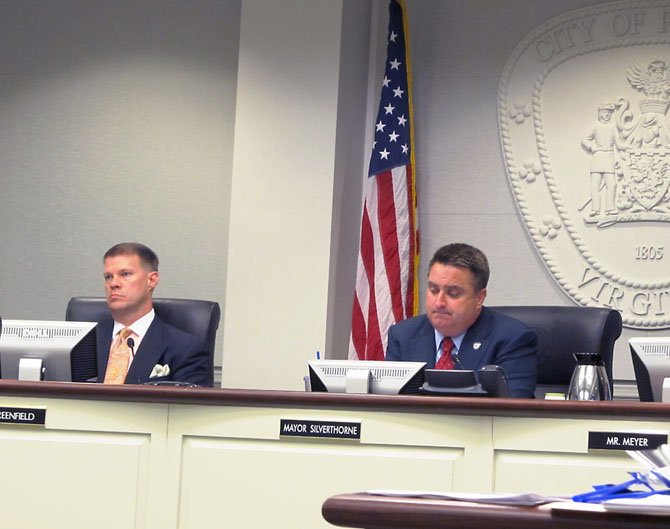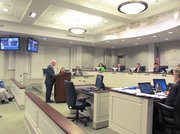Fairfax City Council member Jeff Greenfield and Mayor R. Scott Silverthorne listen to residents during a public hearing on Tuesday, April 9, debating whether to remain in the water business. Photo by Victoria Ross.
After a half century of controlling its own water system, the City of Fairfax voted unanimously Tuesday, April 9, to get out of the increasingly costly water business.
“Who we procure water from doesn't define us. We’re not our water system. This is a vote for our present and our future.”
—Dan Drummond, city council member
The city council’s history-making decision closes one contentious chapter of Northern Virginia’s “Water Wars,” which has embroiled four local governments, powerful politicians, high-priced legal teams, the U.S Army Corps of Engineers, and a billion-dollar utility company.
“Change is, indeed, never easy,” said Mayor Scott Silverthorne, at the end of a public hearing on the issue Tuesday. “I was firmly in the other camp a year ago. … I know this has been painful and none of us were thrilled having to make this decision. At the end of the day we all believe it's the right course of action.”
Civic pride in owning its water system was not enough to justify the millions of dollars it would take to maintain and litigate Fairfax County and Fairfax Water to keep the City of Fairfax in the water business. According to city officials, it would take $45 million in upgrades to its current water system to remain in the water business.
Council members were sensitive to the issue of civic pride and the city’s long history of independence.
“It’s an important part of our history. We’re all proud of our independent water system. But, we’ve been forced to reevaluate,” said council member Ellie Schmidt. “I don’t like giving up control, but … our citizens will benefit from lower water rates.”
“We have to set pride to one side, and focus on the business decision,” said council member Jeff Greenfield. “We have a responsibility to focus on present and look to future. We have opportunity and obligation to save our customers water and high quality.”
Council member Dan Drummond contended the city’s pride of place is not dependent on its water system.
“Who we procure water from doesn't define us. We’re not our water system. This is a vote for our present and our future,” Drummond said.
Before Tuesday’s vote, city council members heard from about a dozen residents, most of whom spoke in favor of converting to Fairfax Water.
“I’m retired on reasonably fixed income,” said longtime city resident Wayne Turk. “When I look at the projected cost to stay in the water business, it makes me awfully nervous. One of the reasons we're thinking about keeping this is city pride? Doesn't seem like that’s a good idea,” Turk said.
City resident Rob Flynn agreed: “The City of Fairfax is in a big donut … let’s do the things we do well, and get out of the things we don’t.”
A few residents said they remained opposed to selling the city’s water system, and suggested putting the question to a referendum.
Council member Steve Stombres said the city does not have time for a referendum on the ballot.
“We have pushed this back as far as we can under our mediation agreement … I have always been proud that we had our own water system, but things have changed. I believed the community was willing to pay a premium to stay in water business, but we are long past the economic viability of that. I am satisfied the benefits outweigh the drawbacks,” Stombres said.
Fairfax County Board of Supervisors Chairman Sharon Bulova reacted swiftly to news of the unanimous vote. "I am very pleased. This is a win-win decision for both Fairfax City and Fairfax County residents,” Bulova said.
Silverthorne said the city’s decision will resolve pending litigation against Fairfax County, and save the city additional legal costs. The city’s lawsuit against Fairfax County halted the county from enacting an ordinance to regulate the city’s water fees last July.
The lawsuit stemmed from an ordinance enacted in December, 2011, by the Fairfax County Board of Supervisors that gave the county broad powers to determine how residents got their water and how much they paid for it.
County officials said the new law was an attempt to ensure that all county residents pay a “fair and reasonable” rate for their water. But city leaders said the ordinance was a blatant power grab, and promptly sued the county.
What Happens Next?
In choosing to get out of the water business, the average water residential bill will be about $340 by 2018, compared to $894. Average commercial customers will see significant cost savings as well, with annual bills averaging $2,481 under the Fairfax Water plan versus $6,528 if the city retained its utility.
Currently, the average city rate for 1,000 gallons of water is $4.64 compared to $2.51 for Fairfax Water customers. Typical annual usage is about 100,000 gallons of water, according to city officials.
Fairfax County resident Kirk Randall, whose home borders the City of Fairfax, said he is thrilled with the decision.
Randall is one of the 21,000 county residents who has paid 71 percent more for water because he gets his water from the City of Fairfax rather than Fairfax Water.
“I’m pleased that our water rates will actually decline instead of doubling or tripling under the status quo. However, while lower water rates are high on my list of priorities, perhaps even more important is reliability.”
‘Retail’ vs. ‘Wholesale’ Agreement
Silverthorne said the single factor that changed his mind was the advantage of a “retail option,” vs. a “wholesale” option.
About a year ago, the city considered—and ultimately rejected—a plan to become a “wholesale” customer of Fairfax Water. Under that option, the city would have purchased water at wholesale rates from Fairfax Water and re-brand it into Fairfax City water. But distribution costs would have been significantly higher because the city’s distribution system is much smaller than that of Fairfax Water.
After mediation with Fairfax county and Fairfax Water, a “retail option” was put on the table, and it’s this option that changed the mind of Silverthorne and many city residents. By becoming “retail” water customers, the city will essentially sell its water system to Fairfax Water, which will take over all water production, transmission and distribution functions to deliver its water to the city’s existing customers.
By converting to Fairfax Water, city officials said city water customers will realize a number of benefits, including:
Lower rates: In 2018, average annual cost savings are estimated at $554 for residential customers and $4,047 for commercial customers.
Water treatment enhancement: Fairfax Water’s treatment plants provide drinking water using state-of-the-art treatment processes that would not be possible if the city had to expend $45 million to refurbish its water treatment facilities.
Expanded capacity to address water outages: The city currently has no long-term backup for its Loudoun County treatment and transmission facilities. Each time the city declares a system emergency—which has occurred about every five weeks in recent years—it relies on Fairfax Water to provide water. Jeanne Bailey, a longtime city resident and the spokesperson for Fairfax Water, said that many city residents don’t fully understand the vulnerability of the city’s system. She said Fairfax Water has 17 billion gallons of upstream storage ready to go in the event of a drought, but specifically prohibits the city from buying emergency water during a drought because it’s an event that can be “planned-for,” not an emergency.
Cost of converting to Fairfax Water offset by sale of city-owned water treatment properties in Loudoun County: The timing of transferring to Fairfax Water now—before costly upgrades to the city’s water treatment plant—means money is saved and the can sell the Loudoun properties in the current condition.
Silverthorne, who was elected mayor in May 2012, said he believed this was the right decision for current and future residents. “I can see, years down the road, if we had kept on this path, the future mayor and city council would say ‘what in the world were they thinking?’”
“This is a historic decision,” Silverthorne continued. “We have vetted this decision and we have kept the community fully informed and involved. We can be proud of that.”


